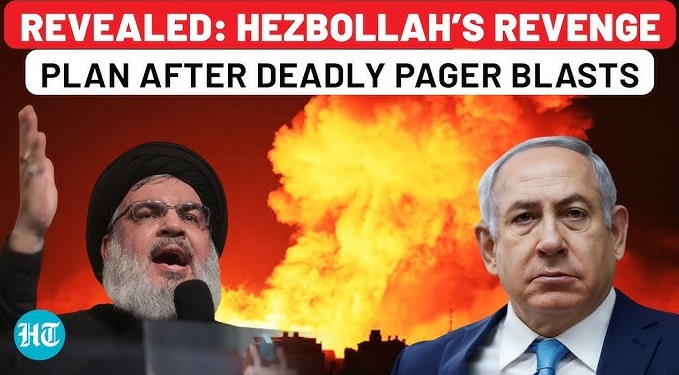
Drums of wars are beating louder after pagers used by members of militant group Hezbollah exploded on Tuesday in Lebanon and Syria, killing at least nine people and injuring several thousand, writes ‘The India Times’.
Hezbollah and the Lebanese government blamed Israel for the coordinated attack. These devices, modified by Israel's spy agency Mossad, were embedded with a small amount of explosives which were triggered remotely, Reuters has reported quoting sources. The Israeli military, which has been engaged in an exchange of fire with Hezbollah since October, coinciding with the Gaza war, did not provide an immediate response to the incident.
Many think the pager attack can trigger a bigger war even as Israel has put Hezbollah in its cross hairs and plans to widen its offensive on its northern border with Lebanon. Though Hezbollah, based in Lebanon, is a militant group backed by Iran, its military might matches that of a midsized country.
The scale and effectiveness of the operation have been described as one of the most significant intelligence failures for Hezbollah in recent years. Jonathan Panikoff, a former US national intelligence officer in the Middle East, labeled it as “the biggest counterintelligence failure Hezbollah has faced in decades.”
Following the attack, Hezbollah has promised retaliation against Israel, labeling the incident as “Israeli aggression.” Lebanese information minister Ziad Makary condemned the attacks, while a Hezbollah official stated, “Israel will receive its fair punishment” for the blasts. The group confirmed that among the casualties were its fighters and civilians. "This is not a security targeting of one, two or three people. This is a targeting of an entire nation," senior Hezbollah official Hussein Khalil said.
Until now, Israel's objectives have been to crush Hamas and to bring home the hostages taken by Palestinian militants during the October 7 attacks that sparked the war. While the focus of the war has been on Gaza, the unabating exchanges of fire between Israeli troops and Hamas ally Hezbollah in Lebanon have forced tens of thousands of people on both sides of the border to flee their homes. Among goals of the war, Israel has now included "the safe return of the residents of the north to their homes" which means Hezbollah is now in its crosshairs.
Not formally declared as a war, the exchanges of fire between Israeli troops and Hezbollah have killed hundreds of mostly fighters in Lebanon, and dozens of civilians and soldiers on the Israeli side. The Israeli announcement came a day after Defence Minister Yoav Gallant said "military action" was the "only way left to ensure the return of Israel's northern communities".
The military capabilities of Hezbollah, reinforced by the strategic leadership of Hassan Nasrallah and the group's alliances with Iran, represent a considerable factor in Middle Eastern geopolitics, as per an analysis by Israel Defence Forces (IDF). The organization's extensive missile inventory, sophisticated weaponry, and advanced technology position Hezbollah as a formidable entity in the Hezbollah Israel dynamic.
The armament capabilities of Hezbollah Lebanon are notable and more similar to that of a midsize country’s army, as per an IDF report. It boasts over 150,000 rockets and missiles, including the Iranian made Fajr-5 and Zelzal-2 rockets. These armaments underscore the threat that Hezbollah poses to Israeli security, as their arsenal is capable of reaching deep into Israel's territory. Hezbollah has built itself into the world’s most powerful non-state actor.
read more in our Telegram-channel https://t.me/The_International_Affairs

 11:04 21.09.2024 •
11:04 21.09.2024 •






















